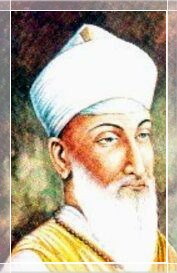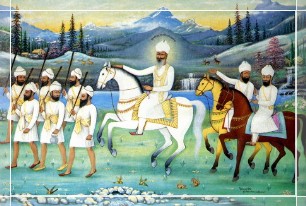namdhari world
Main menu:
- Home Page
- Kuka Faith
- History
- Sikh Gurus
- Namdhari Gurus
- Freedom Fighter - Satguru Ram Singh Ji
- Warrior of Peace
- Non-Cooperation Movement page 1
- Non-Cooperation Movment page 2
- Kuka Postal Service
- No Trial
- Battle for recognition as part of India's struggle for freedom
- Plaque at Ludhiana Railway Station
- Ram Singh Kuka by G.K.Venkateshamurthy
- Social Reforms by Satguru Ram Singh Ji
- Birth of Sant Khalsa
- Kuka Movement - by Film division of Government of India
- KUKA LEHAR - India's first war for independance (1856)
- Satguru Jagjit Singh Ji
- Contradictions
- Historical Quotes
- Vaisakhi - 1699
- Gurmukhi Script
- Sikh Women
- Knowlegde Bank
- Connections
- Places to visit
- Resources
- Music World
- Calendar
- Sports
- ETC...
Non-Cooperation Movement page 1
History > Freedom Fighter - Satguru Ram Singh Ji
Satguru RAM SINGH JI's message was essentially a call to the national exhorting Indians not to cooperate with the corrupt and unjust foreign rulers. And as the numerical and spiritual strength of the Kookas began to grow in the Punjab, they became the romantic heroes of the freedom struggle with a very special way of life and thought.
Important Quotations

'Sikh philospher and reformer and the first indian to use non-cooperation and boycott of British merchandise and services as a political weapon.' - Encyclopedia Brittianca under the entry (Guru) 'Ram Singh'.
 'No Indian can deny the importance of efforts put in by Sat Guru Ram Singh Ji seventy five years back in achieving freedom for the motherland. Congress merely followed the path shown by him and attained independence.'- India's first Prime Minister, 1947.
'No Indian can deny the importance of efforts put in by Sat Guru Ram Singh Ji seventy five years back in achieving freedom for the motherland. Congress merely followed the path shown by him and attained independence.'- India's first Prime Minister, 1947. 'If we set aside all good deeds of Sri Satguru Ram Singh Ji which he preached for goodness of whole mankind on one side, only his preaching for equal rights for men and women in the society take him to list of supreme reformers of the world' (Kapoor Singh I.C.S.).
'If we set aside all good deeds of Sri Satguru Ram Singh Ji which he preached for goodness of whole mankind on one side, only his preaching for equal rights for men and women in the society take him to list of supreme reformers of the world' (Kapoor Singh I.C.S.).
 "Whom neither shape of danger can dismayNor thought of tender happiness betray;This is the happy warrior this he That every man in arms should wish to be" - Sri Satguru Ram Singh was in short the Happy Warrior sung by Wordsworth.
"Whom neither shape of danger can dismayNor thought of tender happiness betray;This is the happy warrior this he That every man in arms should wish to be" - Sri Satguru Ram Singh was in short the Happy Warrior sung by Wordsworth. Acknowledging Sat Guru Ram Singh Ji's contribution and achievement in the freedom movement Dr Rajendera Prasad India's first President wrote:
Acknowledging Sat Guru Ram Singh Ji's contribution and achievement in the freedom movement Dr Rajendera Prasad India's first President wrote:
'In fact it is a historical truth that the non-co-operation and Swadishi movement started by Sat Guru Ram Singh Ji shook the very foundations of the British rule in India. Guru Ram Singh considered political freedom a part of religion. The principles of boycott and non-co-operation which Mahatma Gandhi introduced so vigorously in our freedom movement were expounded by Guru Ram Singh Ji for the Namdharis.'
I shall pass ten months in the womb of a mother and come back to avenge myself. Your justice is a lie. Your death and downfall is near at hand. We shall be born again, hold the sword in our hand and wage a war which will destroy your rule.
Words of a kuka martyr before being hanged
 Namdhari Sikhs have an honoured place in the history of India's freedom struggle. They were the first to evolve non-cooperation and the use of swadeshi as political weapons. As early as the 1980's they boycotted British goods, government schools, law courts and postal services. They emphasised the wearing of hand spun khadi sixty years before it was taken up by Mahatma Gandhi. - Khushwant Singh
Namdhari Sikhs have an honoured place in the history of India's freedom struggle. They were the first to evolve non-cooperation and the use of swadeshi as political weapons. As early as the 1980's they boycotted British goods, government schools, law courts and postal services. They emphasised the wearing of hand spun khadi sixty years before it was taken up by Mahatma Gandhi. - Khushwant Singh
The whites will banish me from the country. They will declare me dead. None should beleive this as fire cannot burn me and water cannot drown me. I will reappear in my original form.
**************************************************
Even if a butcher with his knife soaked in blood of cow comes to your door step for food, he must be given food, failing which you will invite the wrath of the Guru and never be pardoned.
**************************************************
The torch of freedom struggle that I have kindled in the hearts of people, will not only keep burning but spread to all nooks and corners of the country. The more you try to extinguish it, the more violently it will flash. No one can extinguish it till independance is acheived.
- Satguru Ram Singh.

Satguru Ram Singh ji was the first in world history to have used non-cooperation as a weapon to free his country from the yoke of the British Empire. Mahatma Gandhi talked of it later. The repurcussions of this novel idea was to become an intergeral part of fighting oppression in many corners of the world. Martin Luther King and Nelson Mendla adopted the same principle.
But sadly, for years, Satguru Ram Singh Ji's great gift to mankind was only to be talked about in Namdhari media. Even today many indians, let alone the world, are void of this first chapter in their history of the fight for India's independance. But in Dec 2008, the government finally honoured the acheivements of the Kookas fighters and the contribution of Sat Guru Ram Singh’s non-cooperation movement. A picture of the Guru is now present inside the houses of the Indian Parliment.
Sat Guru Ram Singh’s non-cooperation movement entailed boycott of government services, of educational institutions opened by the British of law courts started by the British and foreign goods. He believed political freedom was a part of religion.
He found western influence detrimental to the simple living of his countrymen and to the solidarity and integrity of his motherland and protested vehemently against the onward March of European culture in India. He looked askance at the introduction of the foreign manufactured articles, especially the foreign cloth, and advocated the use of Swadeshi. Naturally the movement if non-co-operation with the foreigners, that he had started could not be appreciated by the Government and strong measures were adopted to stop the newly started campaign.
Sri Satguru Ji was interned to stop the publicity of his views at Bhaini Sahib and therefore he appointed twenty two Subas to spread the word beyond Bhaini.
Sat Guru Ram Singh Ji set up his own postal system. Diplomatic relations were established with native states and neighboring countries such as Nepal, Afghanistan and Russia. In 1869-70, a separate regiment “Kooka platoon” was created in the Kashmir State. Namdharis revolted against the British rule.
Against the the "divide and rule" policy of the British Government (encouraging the cow-killers and crushing the sentiments of the Hindus and Sikhs) a group of brave Namdharis rose to the occasion and attacked the butchers in slaughter houses at Amritsar (adjoining the Golden Temple - due to which the sanctity of the shrine was being desecrated) on June 15, 1871, and then Raikot on July 15, 1871. The British Government reacted quickly. But could not arrest the persons who had raided the slaughter houses.
WHY THEY WERE NOT TRIED
The British government of India held the view that the Kuka prisoners or the Subas of Guru Ram Singh should be brought to trial on specific charges, but the Punjab Government differed and insisted that they be kept in detention. Finally, the Government of India also agreed and reported the same to the Secretary of State for India. It shows that the pressure of the Punjab government was too great and their detention under Regulation III of 1818 was absolutely due to their attitude. This is clear from the Government of India letter No. 60 dated the 27th December, 1872 (Fort William) addressed to the Secretary of State.
It is important to note that the Punjab Government was frankly genuine about the judicial trial. In their telegram dated the 19th January 1872 they had written to the Government of India thatthey did not possess any direct evidence against Guru Ram Singh, to be able to put him on trial.
When this telegram reached, the Government of India the very next daythe following minute was recorded, by a member of the Viceroy’s council which exposes how the mind of British bureaucracy was acting:
“It will probably be necessary to issue warrants under Regulation III of 1818 (the Bengal Act) as under the ordinary law these men would have to be examined by the local magistrate and committed to the local goal”.

Satguru Ram Singh with his soobas

The Bunglow in Rangoon (Burma) where Satguru Ram Singh was confined.